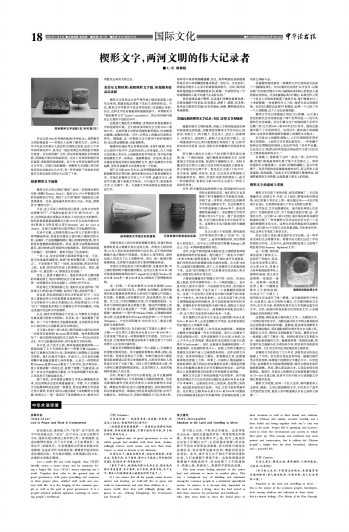安居乐业/ānjū-lèyè/Live in Peace and Work in Contentment
安定地生活,愉快地工作。“安居”,安于居所,指平平安安地生活。“乐业”,乐于本业,以自己的职守为乐,指快乐地从事自己的本职工作。形容国家、社会治理得非常好,天下太平无事,人们各得其所,各安生计,幸福快乐。它是普通民众所抱有的基本社会理想,也是有所作为的政治家、管理者所追求的社会治理的目标。作为政治理想,它体现着以民为本、注重民生的基本精神。
Livea stable life and work happily. Anju (安居)literally means a secure house and by extension liv⁃ing a happy life. Leye (乐业) means enjoying one’s work. Together they refer to the general state of good governance, with peace prevailing and everyone in their proper place,
satisfied with work and con⁃tent with life. It is the longing of the common peo⁃ple as well as the goal of good governance.
It is a peopleoriented political aspiration centering on secur⁃ing people’s livelihood.
引例 Citations:
◎至治之极……民各甘其食,美其服,安其俗,乐其业。(《史记·货殖列传》引《老子》)
(治理国家的最高境界……是使民众觉得吃的饭很香甜,穿的衣服很漂亮,习惯于他们的习俗,乐于他们所从事的行业。)
The highest state of good governance is one in which people feel satisfied with their food, clothes,willingly observe social
norms, and love their trade.(Laozi,as cited in Records ofthe Historian)
◎普天之下,赖我而得生育,由我而得富贵,安居乐业,长养子孙,天下晏然,皆归心于我矣。(仲长统《理乱篇》,见《后汉书·仲长统传》)
(普天下的人,依赖我而得以生存生长,因为我而得以享受富贵,安于居所,乐于本职,养育子孙,天下太平,那么人们就都会真心诚意地归附于我了。)
If I can ensure that all the people under heaven survive and develop, are well-off, live in peace and work in contentment, and raise their children in asecure world, then they will willingly pledge allegiance
to me. (Zhong Changtong:On Governance and Turmoil)
安土重迁/āntǔ-zhònɡqiān/Attached to the Land and Unwilling to Move
安于故土生活,不轻易迁往他处。这是传统农业社会一般民众普遍具有的一种思想观念和情感。其实质,首先是离不开土地,因为土地是农业社会人们赖以生产、生活的基本资源;其次是离不开祖宗坟茔和血亲家族,因为传统中国是宗法制社会,祖宗崇拜是基本信仰,聚族而居是社会常态。此外,离开自己生于斯长于斯的环境和社会,人们会感到不便或不安。这种思想观念和情感偏于消极或保守,但也体现了人们热爱家乡、热爱土地、热爱亲人、热爱和平的纯良品格。
Thisterm means feeling attached to the native land and reluctant to move to another place. This was a widespread way of
thinking and sentiment among the common people in a traditional agricultural society. In essence, it is because they depended on
the land to make a living, since the land served as their basic resource for production and livelihood.Also, they were loath to
leave the burial place of their ancestors as well as their family and relations.In the Chinese clan system, ancestor worship was
a basic belief and living together with one's clan was the social norm. People felt it upsetting and inconvenient to leave
the environment and society in which they grew up.
This concept and sentiment may seem passive and conservative, but it reflects the Chinese people's simple love for their homeland,
relatives,and a peaceful life.
引例 Citation:
◎安土重迁,黎民之性;骨肉相附,人情所愿也。(《汉书·元帝纪》)
(安于故土生活,不轻易迁往他处,是普通百姓共通的情性;亲人相互依存,不愿分离,是人们共有的心愿。)
Attached to the land and unwilling to move this is the nature of the common people. Interdependent among relatives and reluctant to leave them this is a shared feeling. (The History ofthe Han Dynasty)



 上一版
上一版


 缩小
缩小 全文复制
全文复制 上一篇
上一篇